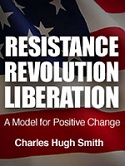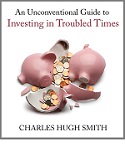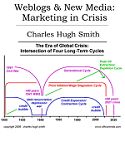

|

|
|||||||||||||
|
The Obesity Puzzle (December 5, 2012) Obesity and well-being are not just a matter of carbs/no-carbs; the causal chain is not that simple. There are almost as many theories about why obesity has exploded in America and the world since the 1980s as there are researchers compiling data. The rise in Body Mass Index (BMI) appears to correlate with the rise of high-fructose corn syrup (HFCS), a simple carbohydrate. Let's begin by comparing two charts from the Centers for Disease Control (CDC) which depict obesity levels on a state by state basis: the first in 1985 and the second, a generation later in 2008.
Clearly, obesity has exploded into a pandemic in just a single generation. Interestingly, all the usual explanations--the rise of fast foods, women joining the workforce and thus the decline of the home-cooked meal and the decline of physical labor jobs--fail to explain the dramatic increase for the reason that all these conditions were already present in 1985. Women had already joined the workforce en masse, fast-food outlets were already on every corner and jobs requiring hard physical labor had already dwindled to a small percentage of our post-industrial, service-dominated economy. So what is different between 1985 and the present? At least one factor is the increased consumption of sugary beverages--soda, specialty coffees, iced teas, fake "juices" (colored sugar water with 10% actual fruit juice)--and the addition of HFCS to everything from snacks to breakfast bars to canned soups.
As a consequence, consumption of fructose (both "natural" and high-fructose corn sweetener, HFCS) has skyrocketed.
Reader R.W. recently submitted this account of his own family's experience, and what they discovered by consulting with one of the nation's leading experts in Pediatric Endocrinology.
I’ve attached a YouTube film of a lecture by Dr. Robert Lustig, head of Pediatric Endocrinology at UCSF Medical School. This is an explanation of the biological--and political--mechanism that causes obesity and Type 2 diabetes, and why they’ve become an epidemic. Sugar: the Bitter Truth (University of California TV) Here is the puzzle: Everyone agrees that "empty calories" contribute to obesity, and many see simple carbohydrates as the key cause of obesity. On the other hand, I personally know many slim, healthy Asians whose diet is based on white rice and processed-flour noodles--the very sort of simple carbs that are supposed to make us all fat. Yes, they also eat small portions of fish and meat and significant quantities of vegetables, but you can't get away from the fact that much of their caloric intake comes from processed carbohydrates. The famous Mediterranean Diet is based on pasta as well as olive oil, fish, vegetables and wine: The Island Where People Forget to Die:
She found that her subjects consumed about six times as many beans a day as Americans, ate fish twice a week and meat five times a month, drank on average two to three cups of coffee a day and took in about a quarter as much refined sugar — the elderly did not like soda. She also discovered they were consuming high levels of olive oil along with two to four glasses of wine a day. If carbs were the sole cause of obesity, then the Asians I personally know who probably get up to 60% of their calories from white rice or white-flour noodles should be grossly obese--instead, they're thin. (They only get fat if they live in the U.S. and start eating an American-style diet.) How do we explain this paradox? I recently corresponded with David B. Collum, Professor of Chemistry at Cornell University, who noted two potentially important factors:
I was in Germany a month ago and noticed (1) the grocery stores no longer look like markets but rather supermarkets with all the brightly colored packages of processed food, and (2) the Germans are getting fat. I think there is plenty of evidence to support these two points: 1. That there are significant amounts of simple carbs (HFCS etc.) "hidden" in the processed foods Americans consume in quantity, and 2. It is the ratio and type of fats and carbs that generates weight gain, not carbs alone--that is, a carb-rich, low-fat diet based on legumes and vegetables typical of traditional Asian diets does not lead to obesity, even though the carbs consumed are simple/processed white rice and white-flour noodles. I would add a third factor, which is the paucity of vegetables, fruits and legumes in the American diet. Just avoiding carbs does not make one healthy. It's not just avoiding carbs that counts, it's avoiding all processed foods and sugar-laden beverages. Lastly, let's not forget exercise, which dramatically alters our metabolism, blood sugar and psyche. Cutting our processed foods and simple carbs (empty calories) is only the first step--the second equally important step is getting fit via daily or almost-daily exercise of the sort that builds muscle mass and endurance. People who live long healthy lives are always on the move, and are doing so with purpose. Resources: Gary Taubes' books: Why We Get Fat: And What to Do About It Good Calories, Bad Calories: Fats, Carbs, and the Controversial Science of Diet and Health This book presents evidence that vegetables and complex carbs are essential, meat less so: These articles were written by a physicist who decided to investigate/experiment via his own weight loss program:
NOTE: I will be taking a few days off from online work, so I will be unable to
respond to email. Thank you for your understanding.
SPECIAL OFFER ON GREEN COFFEE BEANS FOR LONG-TERM STORAGE FROM EVERLASTING SEEDS: Here is a note from ES's founder: "I've successfully stabilized green coffee beans for a period of six years and still had them roast up to within 90-95% of their 'new' bouquet, smoothness, and flavour characteristics. We've finally got all of the odds and ends together, along with the best 'stove top' roaster {Whirley Pop} that we're found. The coffee beans are all 100% Organic: Peruvian, Colombian, and Guatamalean in two sizes, 1 lb. And 5 lbs. the sealed cans contain a small 'Roasting Guide' that gives basic instructions, roasting times and temps, etc. This is, by necessity, only a brief intro with the essential information, as it has to fit into our smaller, 'chowder' size can.
It's taken me nearly ten years to experiment, wait, and finally find a method that would
preserve the bean's natural flavours and oils. The other thing that suggested itself to
me is that I can think of few things, outside of the obvious 'necessities'
{Bible, beans, bullets} that would be more valuable, command a higher price, and be
virtually instantly 'tradeable' anywhere, anytime after an 'event': coffee is, in
a multitude of ways, our latter day 'comfort food.'"
My new book Why Things Are Falling Apart and What We Can Do About It is now available in print and Kindle editions--10% to 20% discounts.
Things are falling apart--that is obvious. But why are they falling
apart? The reasons are complex and global. Our economy and society have structural
problems that cannot be solved by adding debt to debt. We are becoming poorer, not
just from financial over-reach, but from fundamental forces that are not easy to identify
or understand. We will cover the five core reasons why things are falling apart:
 1. Debt and financialization
1. Debt and financialization
2. Crony capitalism and the elimination of accountability 3. Diminishing returns 4. Centralization 5. Technological, financial and demographic changes in our economy Complex systems weakened by diminishing returns collapse under their own weight and are replaced by systems that are simpler, faster and affordable. If we cling to the old ways, our system will disintegrate. If we want sustainable prosperity rather than collapse, we must embrace a new model that is Decentralized, Adaptive, Transparent and Accountable (DATA).
We are not powerless. Not accepting responsibility and being powerless are two sides of
the same coin: once we accept responsibility, we become powerful.
To receive a 20% discount
on the print edition: $19.20 (retail $24), follow the link, open a Createspace account and enter
discount code SJRGPLAB. (This is the only way I can offer a discount.)




Please click on a book cover to read sample chapters
NOTE: gifts/contributions are acknowledged in the order received. Your name and email remain confidential and will not be given to any other individual, company or agency.
"This guy is THE leading visionary on reality.
He routinely discusses things which no one else has talked about, yet,
turn out to be quite relevant months later."
Or send him coins, stamps or quatloos via mail--please request P.O. Box address. Subscribers ($5/mo) and contributors of $50 or more this year will receive a weekly email of exclusive (though not necessarily coherent) musings and amusings. At readers' request, there is also a $10/month option. What subscribers are saying about the Musings (Musings samples here): The "unsubscribe" link is for when you find the usual drivel here insufferable.
All content, HTML coding, format design, design elements and images copyright © 2012 Charles Hugh Smith, All rights reserved in all media, unless otherwise credited or noted. I am honored if you link to this essay, or print a copy for your own use.
Terms of Service:
|
Add oftwominds.com |